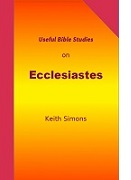Useful Bible Studies > Ecclesiastes Commentary > chapter 8
Is it better to be good or evil?
Ecclesiastes 8:12-13
As evening approaches, shadows become longer. And they continue to grow longer until, in the end, darkness covers the earth.
A shadow seems a good description of the effects of a wicked person’s life. Everywhere he goes those evil effects follow him like a shadow. As he grows older, his evil deeds continuously increase. If he lived long enough, he would control the whole earth by means of his wicked acts.
But that cannot happen, insists the author of Ecclesiastes. Although the wicked person may live for a long time, he will certainly die. And then, unlike a shadow, his power will suddenly disappear.
The author explains why wicked people are so evil. It is because they do not respect God. They do not care that he is their judge (Ecclesiastes 3:16-17). So they do not obey his laws.
It is interesting to contrast Proverbs 4:18 with Ecclesiastes 8:13.
Proverbs 4:18 describes the good person’s life as like the first light of dawn. That light increases until the full light of day. Light overcomes darkness (John 1:5; 1 Thessalonians 5:4-5; Psalm 37:6).
Ecclesiastes 8:12-13 tells us the good person respects God. And its author insists that it is ‘better’ to be a good person than a wicked person. He does not mean the person’s wealth or the length of his life (Ecclesiastes 8:12), or anything else in this world. The good person is ‘better’ because of something that God will do in the future. He will be the judge of all people (Ecclesiastes 3:17). And he will reward the person who respects him (1 Samuel 2:30).
Next part: Who should enjoy life most? (Ecclesiastes 8:14-15)
 Please use the links at the top of the page to find our other articles in this series. If you find these articles useful, you will like our book, available from Amazon.
Please use the links at the top of the page to find our other articles in this series. If you find these articles useful, you will like our book, available from Amazon.
You can download our articles on several Bible books, free, from our download page (including our free 1000+ page course book).
© 2019, Keith Simons.